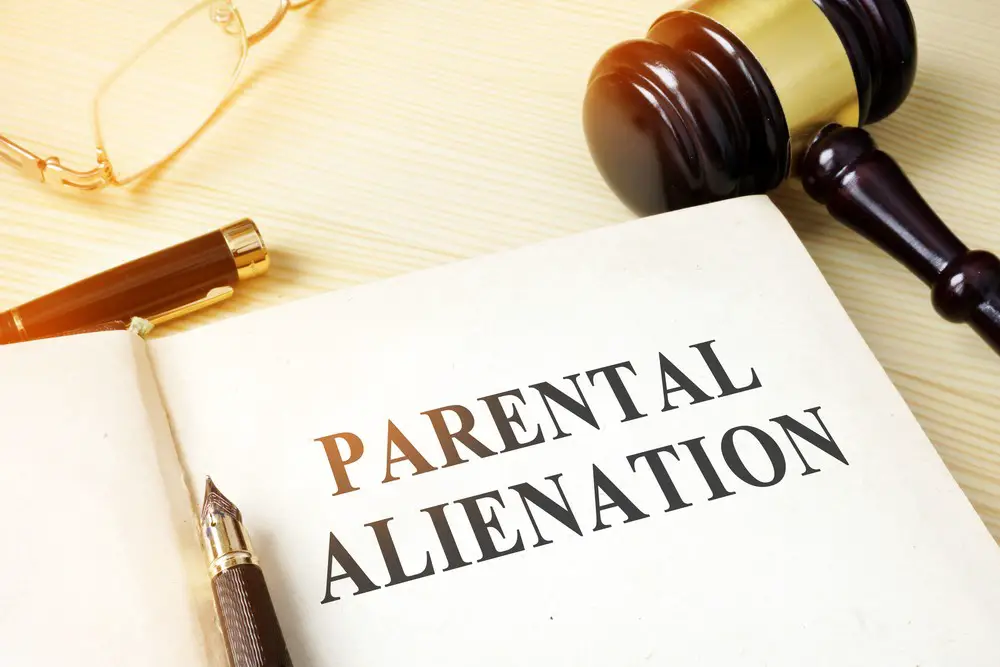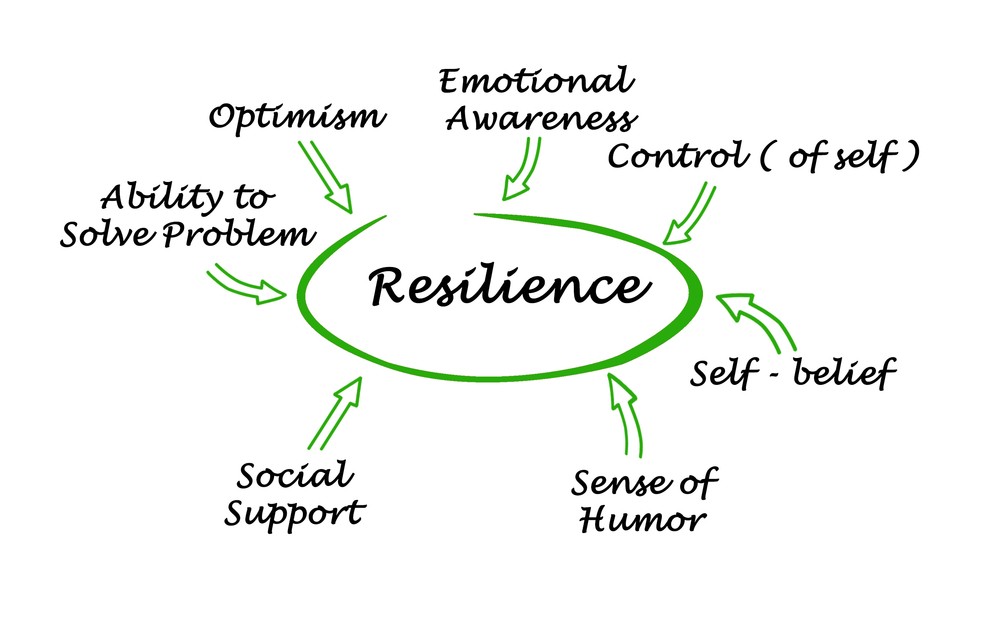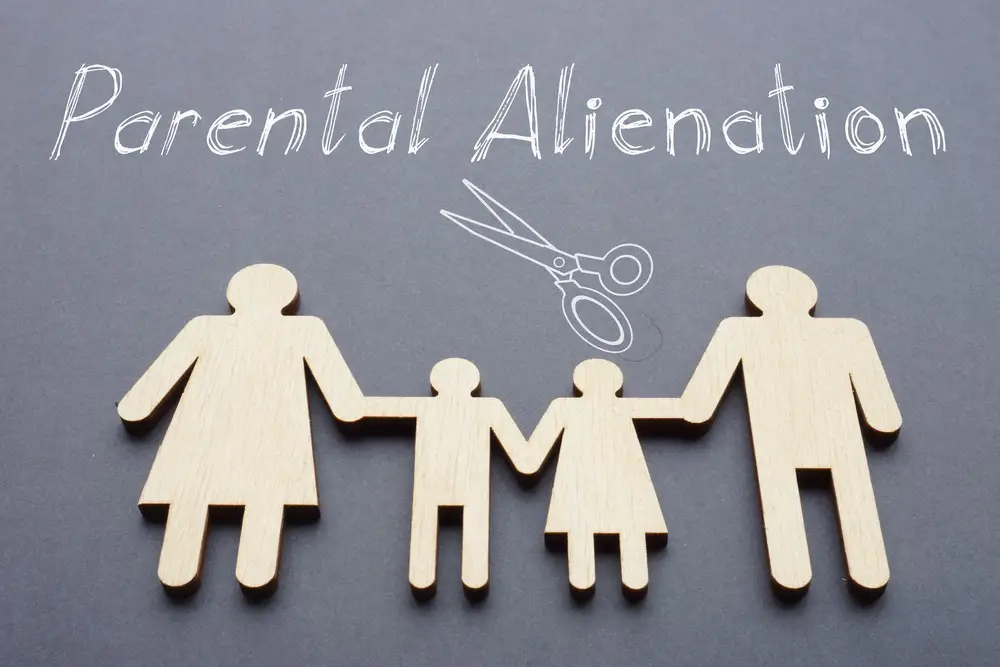As a BetterHelp affiliate, we receive compensation from BetterHelp if you purchase products or services through the links provided
Parental alienation has left a deep scar in my heart, a lingering ache that reminds me daily of the bond I once shared with my children. Before the storm, we lived harmoniously; despite the two households, our laughter resonated through the rooms, and our love was a living entity. Yet, as the clouds of alienation darkened our skies, that bond started to fray. It’s been eight grueling months since I last heard their voices or saw their faces, a stark contrast to the years of close-knit relationship we previously enjoyed. The sinister grasp of parental alienation clawed through our bond, orchestrated by the manipulative hands of my former spouse, especially during the turbulent times following our separation.
Parental alienation isn’t just a term; it’s an agonizing reality, an invisible war where the battle lines are drawn within the very fabric of the family. It’s manipulating innocent hearts, turning them against a parent they once held dear, creating an unfounded fear or disdain towards the alienated parent while unjustly idolizing the other. The journey of understanding and recognizing the signs of this silent torment began as a personal quest, a desperate attempt to make sense of the emotional chasm between my children and me.
With every day that passes, my understanding deepens, and the grave importance of illuminating the signs of parental alienation becomes more evident. It’s not just about mending my broken family tapestry but a call to arms to help others identify these signs early on. As I delve deeper into the varying stages and degrees of severity of parental alienation, the path toward addressing this issue and repairing the frayed bonds within the family becomes a little clearer, albeit laden with challenges.
Key Takeaways:
- Parental alienation is a painful reality involving one parent’s manipulation of a child’s affection, leading to a severe emotional toll on both the child and the alienated parent.
- Recognizing the signs of parental alienation is a critical step toward addressing the issue and working tirelessly toward mending the damaged relationships within the family.
- The spectrum of parental alienation severity is vast, and early identification can significantly influence the course of intervention and the hope for restoring lost connections.

Understanding Parental Alienation
Parental alienation, a term coined by psychiatrist Richard Gardner in the 1980s, occurs when one parent actively tries turning their child against the other, damaging the targeted parent-child relationship. If you suspect parental alienation might be happening in your own family, understanding the signs can help you recognize the issue and take necessary action.
Targeted parents often report that their relationship with their child changes suddenly and drastically for no apparent reason. One day, you might share a close and loving bond with your child; the next, they reject or refuse to communicate with you. This estrangement is a crucial indicator of parental alienation.
In severe cases of parental alienation, you may notice the following signs:
- The child strongly resists any contact with the targeted parent
- The alienating parent speaks negatively about the targeted parent in the child’s presence
- The child may run away or hide to avoid having to visit the targeted parent
To understand parental alienation better, think of the following strategies used by the alienating parent:
- Constantly badmouthing, disparaging, or belittling the targeted parent
- Blaming the targeted parent for problems or difficulties, even if unrelated
- Coaching or influencing the child’s memories against the targeted parent
- Restricting the child’s communication or visits with the targeted parent
If you recognize any warning signs, addressing the issue immediately is crucial. Speak with a mental health or legal professional about your concerns. Remember, it’s not just the targeted parent who suffers from parental alienation; the child is also affected, potentially leading to long-lasting emotional and psychological harm.
Key takeaway: Identifying the signs of parental alienation—such as estrangement, negative talk, and manipulation tactics—can help you recognize and address the issue before it causes significant harm to both the targeted parent and the child.
Recognizing the Signs of Parental Alienation
Parental alienation can significantly impact your child’s mental health and dynamics within your family. To address this issue, it’s crucial to recognize the signs. In this section, we’ll discuss the behavioral changes, emotional indicators, and alterations in relationship dynamics that can signal parental alienation.
Behavioral Changes
Take note of changes in your child’s behavior that seem out of character or sudden. Some common behavioral signs of parental alienation include:
- Being excessively critical of the alienated parent
- Refusing to spend time with or communicate with the alienated parent
- Parroting the negative opinions of the alienating parent
Key takeaway: Consider unusual shifts in your child’s behavior and attitude towards the alienated parent.
Emotional Indicators
Emotional signs of parental alienation can be subtle, but being aware of them will help you identify if your child is experiencing undue fear or anxiety. These indicators may include:
- Excessive anger or resentment directed at the alienated parent
- Feelings of guilt after spending time with the alienated parent
- An unexplained sense of loyalty to the alienating parent
Key takeaway: Keep an eye out for emotional signs in your child, and consider seeking professional help if these patterns continue.
Changes in Relationship Dynamics
Parental alienation can manifest in shifts in the dynamics between family members. Be vigilant about any changes in the way your child interacts with others. Here are some signs of altered relationship dynamics:
- A sudden preference for one parent over the other
- Strained relationships with extended family members connected to the alienated parent
- Alienating parent’s manipulation of rewards or punishments to control the child’s allegiance
Key takeaway: Observe and assess the interactions within your family to detect any manipulative behaviors or changes in closeness. Addressing these issues openly and honestly can help prevent potential long-term effects on your child’s mental health and relationships.

Different Stages of Parental Alienation
During a custody battle or divorce, you might encounter the troubling phenomenon of parental alienation. This occurs when one parent manipulates, criticizes, or employs negative behaviors to turn the child against the other parent without reasonable justification. Dr. Richard Gardner, the child psychologist who first coined the term “parental alienation syndrome” in 1985, observed this as a family dysfunction. To help you recognize and address the issue, let’s explore the different stages of parental alienation.
In the early stage, the alienating parent might subtly undermine the other parent or discourage their relationship with the child. For example, they might make sarcastic remarks about the other parent or consistently schedule activities that interfere with the child’s visitation time. At this stage, you must remain vigilant and communicate openly with your child to maintain a strong bond.
As parental alienation progresses, the alienating parent may intensify their tactics. You might notice these behaviors:
- Interfering with communication: Limiting phone calls, texts, or emails between the child and the other parent.
- Creating mistrust: Encouraging the child to spy on or mistrust the other parent.
- Blocking access to information: Withholding essential details about the child’s life, such as school events or medical appointments.
By this point, it’s crucial to seek professional help and legal advice, as the situation can quickly escalate and have long-lasting effects on your child.
In the most advanced stage of parental alienation, the child may become downright hostile toward the alienated parent. At this stage, the child may display behaviors such as:
- Refusing to speak to or see the alienated parent.
- Making false accusations against the alienated parent.
- Feeling unwavering support for the alienating parent, even when their actions are harmful or unreasonable.
This stage represents a critical moment where decisive action is required to protect the child’s emotional well-being and preserve the parent-child relationship. Contact mental health professionals, legal experts, and support groups to help you navigate this challenging time.
Key Takeaway: Recognizing and addressing the different stages of parental alienation is vital for preserving your relationship with your child during custody disputes or divorces. Stay vigilant, communicate openly, and seek professional advice to protect your child’s emotional well-being.

Impact of Parental Alienation
On Children
Parental alienation significantly impacts children, often causing emotional and psychological harm. They may experience:
- Stress: Children caught in the middle of an alienation struggle can feel tremendous stress, which may lead to physical and mental health issues.
- Low self-esteem: Children who hear negative comments about the targeted parent may internalize those feelings, resulting in diminished self-worth.
- Insecure attachment style: Alienated children can develop an insecure attachment style, affecting their ability to form healthy relationships later in life.
Key takeaway: The effects of parental alienation on children can have long-lasting consequences, shaping their overall well-being and future relationships.
On Targeted Parent
The targeted parent can also suffer immensely from parental alienation. Some everyday struggles include:
- Emotional distress: Losing a relationship with their child can lead to feelings of grief, anger, and helplessness.
- Lower self-sufficiency: The targeted parent may struggle with everyday tasks and function without their child’s love and support.
- Financial struggles: Legal battles to regain access or custody of the child can be expensive, causing added strain and financial difficulties.
Key takeaway: Parental alienation can have significant emotional, practical, and financial consequences for the targeted parent.
On Alienating Parent
While it may not be as apparent, the alienating parent also faces the repercussions of their actions:
- Loss of trust: As the child grows up and becomes aware of the manipulation, they may develop a sense of mistrust towards the alienating parent.
- Strained relationships: Family dynamics often suffer. The alienating parent’s relationships with extended family members and friends may become strained due to their behavior.
- Legal consequences: In some situations, the alienating parent may face legal consequences for their actions, such as losing custody or being ordered to pay for therapy.
Key takeaway: The alienating parent may gain temporary satisfaction from turning the child against the other parent, but they ultimately harm themselves and their relationships in the long run.

Understanding Parental Alienation Syndrome
In 1985, child psychologist Richard Gardner coined the term Parental Alienation Syndrome (PAS) to describe behaviors in a child exposed to parental alienation. This situation often occurs when one parent, usually the custodial parent, turns the child against the other. Understanding the signs and effects of PAS is essential to help those involved and possibly prevent it from happening.
Despite being controversial and not officially recognized as a mental disorder in the DSM-5, many mental health professionals observe its effect on families. Parental alienation can lead to lasting emotional harm and damage relationships between the child and the alienated parent.
Here are some common signs of Parental Alienation Syndrome:
- Unjustified or irrational campaign to vilify the loving parent: The child may dislike and reject the alienated parent, often without a logical reason or baseless accusations.
- Lack of ambivalence: The child might show extreme idealization of one parent over the other, engaging in black-and-white thinking and perceiving one parent as good while the other as bad.
- Severe avoidance: In extreme cases, the child may strongly resist contact with the alienated parent, even running away or hiding to avoid visits or interactions with them.
To better understand PAS, remember these key points:
- Parental Alienation Syndrome is a controversial concept but is still widely recognized by mental health professionals.
- It occurs when one parent influences the child against the other, creating an unjustified negative perception of the alienated parent.
- Look for signs such as vilification, lack of ambivalence, and severe avoidance in children experiencing Parental Alienation Syndrome.
By being aware of the signs and effects of Parental Alienation Syndrome, you can be better prepared to address the situation and provide support for those involved within your own family or in the families of your loved ones. Remember, open communication and empathy are key in these difficult situations.

Role of Therapy in Parental Alienation
Navigating through parental alienation can be challenging, but therapy can be crucial in the healing process for all parties involved. In this section, we’ll explore three primary types of therapy: family, individual, and group.
Family Therapy
Family therapy is essential to addressing parental alienation, as it allows mental health professionals to work with the entire family unit. Reunification is often a primary goal of family therapy, and it typically involves structured sessions where family members can express their feelings, resolve conflicts, and learn new communication strategies. By engaging in family therapy, you can promote healthier relationships between your child and both parents, thereby minimizing the signs of parental alienation.
Key Takeaway: Family therapy improves communication and relationships within the family, helping to reunite alienated parents and their children.
Individual Therapy
Although family therapy can be pretty effective, there are times when individual therapy may be beneficial for the parent and the child separately. Through one-on-one sessions with a mental health professional, you or your child can address any lingering concerns and emotions stemming from parental alienation. It’s important to note that extended individual therapy for the child alone may not be the best approach, as it could potentially reinforce the alienation. However, individual therapy can be helpful when used with other forms of therapy to support the healing process.
Key Takeaway: Individual therapy can help parents and children process their emotions and improve mental well-being while navigating parental alienation.
Group Therapy
Group therapy can also be an effective tool in dealing with parental alienation, as it allows you and your child to understand that you’re not alone in facing these challenges. Engaging with others who have experienced similar situations can provide invaluable support and insights. Group therapy typically involves facilitated discussions with mental health professionals and can cover various topics, including coping strategies, communication skills, and shared experiences.
Remember, it’s essential to consider your family’s specific needs when choosing the appropriate type of therapy. A combination of family, individual, and group therapy may be the most effective approach to address the complexities of parental alienation and work toward reconciliation.
Key Takeaway: Group therapy provides a supportive environment for parents and children to connect with others who have experienced parental alienation, offering strategies and shared understanding.

Legal Aspects of Parental Alienation
Custody Disputes
When dealing with parental alienation, custody disputes often arise. You might experience an ex-spouse attempting to turn your child against you to gain an advantage in litigation. In these cases, a family law attorney can provide invaluable support. Documenting any alienating behavior is essential, as this evidence can be used to your advantage in court.
When the court evaluates custody, the primary concern is always the child’s best interests. If parental alienation is proven, it can significantly impact the final custody arrangement. Remember, maintaining a healthy and supportive relationship with your child is crucial during this process.
Key Takeaway: Document alienating behavior and consult a family law attorney to help you navigate custody disputes.
Visitation Rights
Alienating parents may restrict your visitation rights by sabotaging your parenting time or creating a hostile atmosphere during visitation. This can be frustrating and hurtful for both you and your child.
Communicate openly with your ex-partner regarding your visitation schedule to protect your rights. If they continue interfering, take legal action through a family law attorney. A well-documented pattern of alienating behavior can strengthen your case for enforcing or modifying visitation arrangements.
Key Takeaway: Protect your visitation rights by keeping clear records and seeking legal assistance.
Child Support Issues
Parental alienation can also impact child support. An alienating parent may manipulate your child’s feelings to gain an advantage in child support negotiations. This behavior is not only harmful to your relationship with your child but can also have financial consequences.
To address this issue, maintain transparency in your financial situation. Collaborate with your family law attorney to ensure you provide accurate and complete information to the court. Emphasize your willingness to support your child financially, emotionally, and physically.
Key Takeaway: Be forthright about your financial situation and commitment to your child’s well-being to counter manipulative tactics around child support.
Remember, the primary goal is to protect your relationship with your child. Navigating the legal aspects of parental alienation can be challenging. Still, with the proper support and proactive approach, you can address these challenges and maintain a strong bond with your child.

Preventing Parental Alienation
Divorce and high-conflict family situations can make maintaining healthy relationships with your children challenging. However, there are ways to prevent parental alienation from taking root. Here are a few tips and strategies that may help:
1. Maintain open communication: Keep lines of communication open with your child. Encourage discussions about their feelings and listen to their concerns without judging or becoming defensive. Show empathy and understanding to foster trust and emotional connections.
2. Build a support network: For yourself and your child, surround your family with supportive friends, relatives, and professionals who can provide advice, understanding, and guidance through tough times.
3. Educate yourself: Stay informed about parental alienation by researching and consulting with professionals, such as therapists or legal experts. Knowledge is power in preventing and addressing alienation issues.
4. Foster positive memories: Creating and maintaining positive memories with your child can help counteract negative influences from the other parent. Engage in fun activities, and provide a loving, nurturing environment where your child feels valued.
5. Steer clear of negative talk: Refrain from criticizing the other parent in front of your child or indulging in negative discussions about them. Separating your emotions and grievances from your child’s experiences is crucial.
In summary, preventing parental alienation requires conscious effort and intentional choices. By maintaining open communication, building a support network, educating yourself, fostering positive memories, and avoiding negative talk about the other parent, you can create an environment that encourages healthy relationships throughout the trying times of divorce and high-conflict family situations. Remember, you’re not alone in this journey, and your family can thrive with the right mindset and support.
Dealing With Severe Parental Alienation
Severe parental alienation occurs when one parent manipulates their child to reject, resent, and fear the other parent. This type of alienation can be considered dangerous and emotionally damaging for everyone involved. Here are some strategies to help cope with severe parental alienation:
- Remain persistent: It’s essential to keep trying to maintain a relationship with your child, even if they initially refuse contact or show hostility. Your patience and determination can be crucial in breaking the cycle of alienation.
- Educate yourself: Familiarize yourself with the signs of severe parental alienation and the potential emotional consequences for your child. Understanding the denigration tactics the alienating parent uses can help you develop strategies to counteract the manipulation.
- Seek professional help: Engaging a mental health professional can support you and your child through this challenging time. Find a therapist experienced in parental alienation to provide guidance and coping strategies.
- Consider supervised visitation: If your relationship with your child has deteriorated, supervised visitation can effectively reestablish trust. These encounters offer a neutral setting for you and your child to interact in a safe environment.
- Avoid retaliation: It’s essential not to fall into the trap of badmouthing the other parent or attempting to “brainwash” your child in return. Instead, focus on positive experiences and memories you share with your child.
- Document incidents: Record any alienation or manipulative behaviors you’ve encountered along with the dates. This evidence can be useful in legal proceedings or discussions with mental health professionals.
Dealing with severe parental alienation can be a long and challenging journey. By staying determined, informed, and focused on your child’s best interests, you can help to rebuild your relationship with them.

Accepting the Horizon: Knowing When to Walk Away ?
The voyage through parental alienation is turbulent, where the winds of hope often clash with the storms of reality. Amidst this tempest, there comes a point where the skies seem to whisper a daunting proposition: the notion of walking away. This isn’t about surrender but self-preservation and acknowledging an unbearable truth that sometimes the tide is too fierce, the cost too steep.
Walking away may seem like an antithesis to the innate parental instinct to fight tooth and nail for our beloved offspring. However, the brutal onslaught of relentless alienation, court battles, and emotional warfare can leave one gasping for breath, with the shores of peace seemingly receding further into the horizon.
- Self-Reflection: Delve deep into self-reflection, assessing the emotional, physical, and financial toll the battle has taken. It’s crucial to weigh the potential benefits against the ongoing harm to you and your children.
- Professional Consultation: Engage in thorough consultations with legal and psychological professionals. Their expert advice can provide a clearer picture of the road ahead, illuminating whether the path of litigation and confrontation still holds promise or leads to a dead end.
- Consider the Children: The essence of your battle is the well-being of your children. Evaluating the impact of ongoing conflict on their mental and emotional health is crucial. Sometimes, reducing their exposure to conflict could be a benevolent choice, even if it means stepping back.
- Emotional Wellness: Your emotional wellness is not a luxury but a necessity. The decision to walk away could be a stepping stone towards rebuilding your emotional health, which the tumultuous journey has likely ravaged.
- Future Reconnections: Walking away doesn’t extinguish the hope of reconnection in the future. Children grow and, with time, come to form their understanding and perspectives. The door to rekindle the bond may open with the gentle touch of time and the maturity of understanding.
- New Beginnings: Embrace the possibility of new beginnings. Life extends beyond the battle, and while the scars remain, the beauty of existence unfolds in endless streams of new experiences, relationships, and self-discoveries.
The decision to walk away is laden with a blend of heart-wrenching sorrow and the tender hope for healing. It’s a personal journey of acceptance, forgiveness, and undying love that will forever resonate in the heartbeats of both the parent and the child, awaiting the dawn where love will bridge the chasms that once seemed insurmountable. Through the veil of tears, the prospect of inner peace and eventual reconnection may emerge as a gentle whisper, guiding the heart toward the realm of acceptance and the courage to walk toward new horizons.
Sailing Through Stormy Lawsuits: When Love Demands Justice ?️
The voyage through the rough seas of parental alienation has compelled me to steer my ship toward the daunting shores of the legal realm. When the avenues of communication and reconciliation were bulldozed by deceit and manipulation, the sails of justice seemed to be the only beacon of hope piercing through the fog of estrangement. Armed with an arsenal of undeniable facts, I embarked on a lawsuit, a path laden with both the thorns of challenge and the blossom of potential vindication.
The lawsuit unfurls into two realms: hard and soft damages. The hard damages are the palpable financial burdens borne out of a desperate attempt to stitch the torn fabric of my familial ties. It encapsulates the cost of reunification therapy for my cherished children—a cost embraced with the promise of shared responsibility, a promise that wilted away under deceit. The acquisition of a larger apartment, a court-mandated prerequisite to reunite with my kids, became another chapter in the ledger of hard damages. The promise of compliance once the apartment was secured turned out to be hollow, echoing the silence that now fills the rooms awaiting the laughter and chatter of my children.
On the other hand, soft damages drift into the realm of the intangible, yet they carve deep into the soul. The alienation, the void that replaced the warm hugs and bedtime stories, is a wound that festers with time. While the courts might raise a skeptical brow towards the claims of emotional wreckage, the battle to quantify this torment is a testimony to the unyielding spirit of a parent’s love.
The legal path is not for the faint of heart. It’s a battlefield where love meets the law, where memories stand as witnesses, and every shared past moment is potential evidence of the bond that’s been mercilessly severed.
- Tip: Engaging a seasoned attorney who’s navigated the choppy waters of parental alienation cases could be a game-changer. Their expertise can illuminate the legal avenues available to make the unseen seen, the unspoken heard.
- Remember: Documentation is your ally. Every agreement, every receipt, and every correspondence weaves the narrative courts need to see—the unadulterated truth of love, loss, and the relentless hope for reunification.
As the gavel of justice awaits, the hope to rebuild the bridges to my children’s hearts holds a steady flame against the tempest of parental alienation. Through the storm, the anchor of love remains unyielding, awaiting the dawn where justice will be the lighthouse guiding us back to the warm shores of reunification.
Frequently Asked Questions

What are common symptoms of alienated children?
Alienated children often display signs that indicate their estrangement from one parent. Some common symptoms include:
- Unwavering loyalty to the alienating parent
- A desire to avoid the targeted parent, even without logical reasons
- Mimicking the alienating parent’s opinions, without any independent thought
- Rejecting the targeted parent’s expressions of affection or communication attempts
- Disregarding positive experiences with the targeted parent
Key takeaway: Alienated children typically exhibit strong loyalty to one parent and avoidance or rejection of the other.
How do judges handle cases involving parental alienation?
Judges know parental alienation issues and aim to protect the child’s best interests. In cases involving parental alienation:
- Courts may order a custody evaluation by a mental health professional.
- Legal professionals examine the child’s relationship with both parents, identifying and assessing alienating behaviors.
- Judges make decisions about custody and visitation arrangements, usually trying to support the child’s relationship with both parents.
- In severe cases, a court may restrict or revoke custody from the alienating parent.
Key takeaway: Judges handle parental alienation cases by assessing the child’s best interests and making decisions accordingly.
What are typical alienating behaviors in parents?
Parents who engage in alienation might use tactics such as:
- Badmouthing the other parent to the child or in the child’s presence
- Creating or fabricating stories about the other parent’s actions or intentions
- Manipulating the child to exclude the other parent from activities or events
- Interfering with or preventing communication between the child and the other parent
- Withholding affection or reward when the child shows a desire for a relationship with the other parent
Key takeaway: Alienating behaviors involve manipulation, criticism, and undermining the child’s relationship with the other parent.
What is the impact of narcissism on parental alienation?
Narcissistic parents might be more prone to engage in parental alienation because they:
- Seek control over the child and the family situation
- Desire, admiration, and loyalty exclusively from the child
- Have difficulty empathizing with the child’s emotions and needs
- Use the child as an extension of themselves or a weapon against the other parent
Key takeaway: Narcissism can intensify the risk of parental alienation due to the strong need for control and exclusive loyalty.
Are there any specific laws addressing parental alienation?
Parental alienation laws can vary by jurisdiction. However, several places have enacted or proposed legislation that acknowledges parental alienation:
- Some legal systems consider parental alienation a form of child abuse.
- Evidence of parental alienation may be used in court to make custody and visitation decisions.
- Courts may order professional intervention, therapy, or parenting education to address alienation issues.
Key takeaway: While specific laws may vary, parental alienation is increasingly recognized as a harmful behavior that can impact legal decisions.
How can parental alienation affect mothers and fathers differently?
While both parents can be targeted for alienation, unique challenges exist for mothers and fathers:
- Mothers may be stereotypically seen as naturally nurturing parents, making accusations of alienation against fathers appear more potent.
- Fathers may feel the need to compensate for not being the primary caregiver during the child’s early years, leading to increased vulnerability to alienation tactics.
- Social pressures may make one parent more likely to play into the alienation dynamic.
Key takeaway: Parental alienation can affect mothers and fathers uniquely due to societal expectations and gender stereotypes.
About the Author: Jacob Maslow ?
The journey through the thickets of parental alienation and narcissistic ex-spouses is a daily path, with the echoes of my children’s laughter as my compass. The abrupt halt in cooperation from my ex-spouse during reunification therapy was the storm that capsized the steady boat of shared custody we had sailed for years despite living in two households. As the therapy began to mend my children’s hearts, her narcissistic tendencies sprang into action, severing the fragile bridges of communication and unity.
Every day, I find solace in the rhythmic steps of my long walks, where nature’s whispers attempt to clear the fog of heartache that clouds my thoughts. My battle with mental health found a companion in Lexapro, and I’ve recently enlisted the virtual empathy of BetterHelp to navigate through the emotional whirlpool that parental alienation stirs.
My ex’s escalating narcissism, seemingly intensified by the fading embers of her beauty, morphed into a relentless crusade of illicit affairs and smear campaigns within our community. Her actions are a textbook spectacle of narcissistic behavior, one that now aims to weaponize our innocent children in a bitter game of emotional chess.
Writing has been my solace, my way of transmuting the pain into a beacon of hope and assistance for others sailing in similar stormy seas. Through articles shedding light on mental health and the dark shadows of narcissism, I strive to be a lighthouse for those grappling with similar emotional demons. My legal site further extends a helping hand to those entangled in the legal mire of defiant spouses who scorn court orders and weaponize the tender hearts of children against the other parent.
The past nine months have starkly contrasted the years of warmth and closeness I shared with my children. Yet, the resolve to restore the severed bonds and combat mental health challenges fuels my days. I believe in the resilience of the human spirit to overcome mental health hurdles and the sinister plots of narcissistic ex-partners. Through the veil of pain, the sun of hope peeks, promising a horizon where love triumphs and serenity prevails.

- Breaking the Silence: Why Men’s Mental Health Matters More Than Ever - April 15, 2025
- How to Transform a Home’s Patio Space into a Relaxing Space - March 23, 2025
- 5 Strategies to Use a Cell Phone to Help Manage Your Stress - March 23, 2025
This site contains affiliate links to products. We will receive a commission for purchases made through these links.



